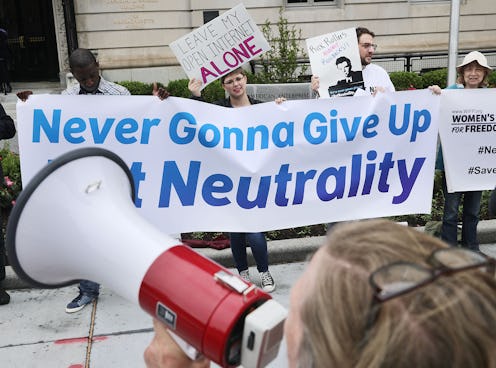News
How Fake Comments May Have Affected The FCC's Decision To Repeal Net Neutrality

On Tuesday, the Federal Communications Commission (FCC) announced that it plans to repeal net neutrality regulations next month, essentially giving internet providers control over which websites its customers can access, as well as the content they are exposed to. Now, the agency is being questioned by critics who believe the FCC's net neutrality process was infiltrated by fake comments — many of them in support of repealing the Obama-era regulations.
New York Attorney General Eric Schneiderman penned an open letter to FCC Commissioner Ajit Pai on Tuesday expressing concerns about a “massive scheme” that had been used “to corrupt the FCC’s notice and comment process through the misuse of enormous numbers of real New Yorkers’ and other Americans’ identities.” Schneiderman explained that researchers and reporters discovered back in May that this scheme allowed for the “submission of enormous numbers of fake comments concerning the possible repeal of net neutrality rules.” He wrote that although his office had requested records from the FCC related to its public comment system, the agency never followed through.
Although the FCC’s announcement that it intends to repeal equal Internet access regulations faced backlash from the start, revelations that the decision may have been supported by false feedback have prompted even more criticism of the agency.
FCC spokesman Brian Hart told The Washington Post that the agency does not have the resources to look into every dubious comment that is submitted. He countered that the "most suspicious activity has been by those supporting Internet regulation," citing some 400,000 comments in support of net neutrality that had come from the same mailing address out of Russia, as well as 7.5 million comments in favor of the regulations that were delivered from a fake email generator website.
But there is also evidence that a significant amount of fake comments have been filed against net neutrality. In a Medium post published Thursday, data scientist Jeff Kao shared findings from a study in which he analyzed comments submitted to the FCC from April to October. He found that at least 1.3 million comments in favor of repealing net neutrality were fake. Kao noted that many of the comments used similar language and expressions, suggesting that they were generated by a computer program.
The FCC has long been aware of concerns that their public comment system has been compromised. Back in May, more than two dozen people wrote a letter to the agency expressing concern that their names and personal information had been used to submit comments to the FCC that they did not make themselves. In an interview with Fight for the Future, a digital rights advocacy group, one individual whose information had been compromised, Joel Mullaney, said, "To see my good name used to present an opinion diametrically opposed to my own view on Net Neutrality makes me feel sad and violated."
But there's a simple reason that agency hasn't felt the urgency to take a closer look at these allegations regarding its public comment system: most members of the FCC's leadership want the net neutrality repeal to go through, and given that Republicans (who overwhelmingly support repealing net neutrality) have control of Congress, it likely will come December.
If the repeal passes, it will be a victory for internet providers, who have long fought for less industry regulation. But it could be a headache for everyday internet users, who would likely face slower service, and be forced to pay steep prices to access certain content should Congress decide to roll back the regulations. If the decision is made based off of false input from millions of computer-generated comments, internet companies may have to deal with some very unhappy customers.